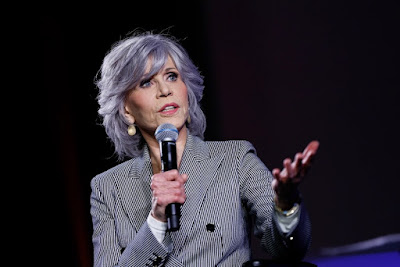Jane Fonda gives Master Class on female centric filmmaking and climate change at Cannes May 27
By Moira Jean Sullivan
Jane Fonda was a guest at the 76th Cannes Film Festival for a Master Class on May 26 in Salle Buñuel. The following evening she was called on to present the Palme d' Or from the official jury. For young people today she is an important major star. Many of this new generation knows her through Grace and Frankie with seven seasons from 2015 – 2022. She spoke about the trajectory of her career and her evolution from "a blonde with a lot of hair" to a young woman that wanted to be a tomboy and ride horses". Cat Ballou (1965) was one of her first films that she liked making because of it. Four films were made with her first husband, French director Roger Vadim such as Barbarella (1969) but Fonda dismissed them as unimportant because she was basically unaware of herself as a woman. In the 1970's her focus turned to civil rights, women's rights and activism.During the Vietnam war she made a political feature Tout Va Bien by Jean-Luc Godard and Jean Pierre Gorin. Later as a response to their film they allegedly made a serious study of a photograph of Jane looking with concern at a Vietnamese man in Hanoi. They pose a series of contradictory rhetorical questions in a pseudo-intellectual mash-up such as how can cinema be used to win the war in Vietnam and what is the role of the intellectual in revolutionary struggle? When asked about Godard, Fonda emphatically replied that Letter to Jane was “narcissistic, and a pile of BS”. In other interviews she revealed that Gorin showed up at her door and physically threatened her to finish Tout Va Bien. (Interview Movie Magazine International, Moira Sullivan 2006) On a trip to North Vietnam with letters for US POWS she was photographed by the Vietcong next to an anti-aircraft gun wearing a helmet that all visitors are required to wear. She asked for it not to be used. From this experience and Letter to Jane she learned how her status as an international actor would be used for political purposes that were misaligned with her beliefs. For a period of time, she declined making films and became involved as an organizer.
In 1971 she made Klute named for a detective (Donald Sutherland) investigating a serial murderer. She plays a sex worker with dark brown hair and won her first Oscar. She started to work with organizers such as United Auto and left her daughter at home with a governess. At these meetings women brought their babies with them and she realized how important it was to be with her child.
Black revolutionary lawyers told her that movie stars in good films were important, and she eventually formed her own film production company. Coming Home (1978) was the first film she produced about a Vietnam soldier (Jon Voigt) who is paralyzed from injuries he sustained on the battlefield. She won an Oscar for her role. She next made a movie about nuclear power plants which earned her another Oscar nomination in The China Syndrome (1978). Fonda plays a newscaster who asks for serious stories and gets her chance to report on a near accident and coverup at a nuclear power plant. 9-5 (1980) was another important film which has become an anthem for working women.
Fonda was dissatisfied with many of the roles offered her and her attention turned to Greenpeace and climate change. In her boldest statement of the evening, she declared that there would be no climate crisis without racism and the patriarchy - that those in power in the fossil fuel industry are white men. She spoke about really listening to what the opposition says with an open heart, never hate the traumatized, and stop supporting politicians who still advocate the use of fossil fuels. Fonda said our time out soon probably within the next seven years to address climate change.
Lily Tomlin, she said, was her “favorite man” to work with in movies. “I don’t feel I am a part of Hollywood".... Activism gave me a life.“I don’t know how to be any different”.
Also significant in the discussion was her response to #METOO where the media has tried to polarize women. “#METOO has made a big difference to report sexual assault and harassment and it’s not over", said Fonda.
At the closing of the festival she gave the Palme d'Or award to French director Justine Triet for Anatomy of Fall. She remarked that the 76th Festival de Cannes has more women in the official competition than any other previous festival and that in time this would become normal. Many of those in the audience asked her for advice as a woman working in the film industry and her activism. Jane Fonda became an important role model to many young people this day at Cannes and it was an excellent choice by the festival to invite her.
Movie Magazine International

Comments
Post a Comment